Are K-Cups Bad for You? [Mystery Solved]
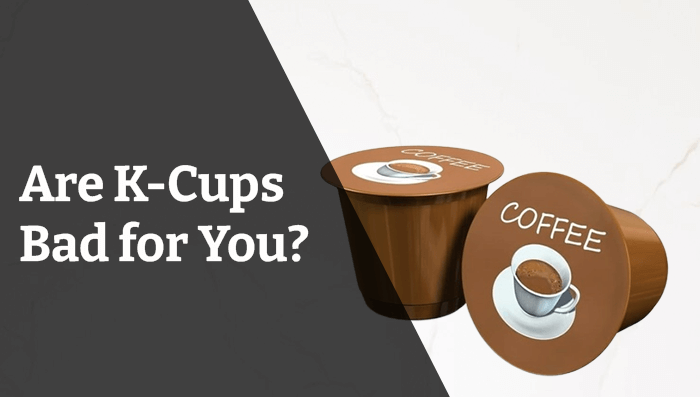
Keurig coffee makers stand above the competition due to their convenience, ease of use, and consistent quality. It’s as simple as picking out your favorite K-cup flavor, putting it in the brewer, and you’re done!
K-cups come in various flavors and blends, giving you extensive options. They also save the hassle of measuring and grinding beans for each cup. Because each K-Cup is airtight, the coffee is always at its freshest.
Regardless of the convenience, Keurig’s environmental and health practices have become scrutinized as their popularity has grown. Consumers now question if K-cups are safe.
Keurig is not your best choice if you care about the environment because of the waste the K-cups create. Similarly, Keurig K-cups contain chemicals that might harm your health.
K-cups have benefits and advantages, but you must be aware of their potential risks and ways to prevent them. Keep reading to understand better and make an informed decision about whether K-cups are bad for you.
What are K-cups Made of?
A K-cup consists of three parts: a container, a paper filter, and a lid. The plastic container contains coffee grounds sealed with an aluminum lid.
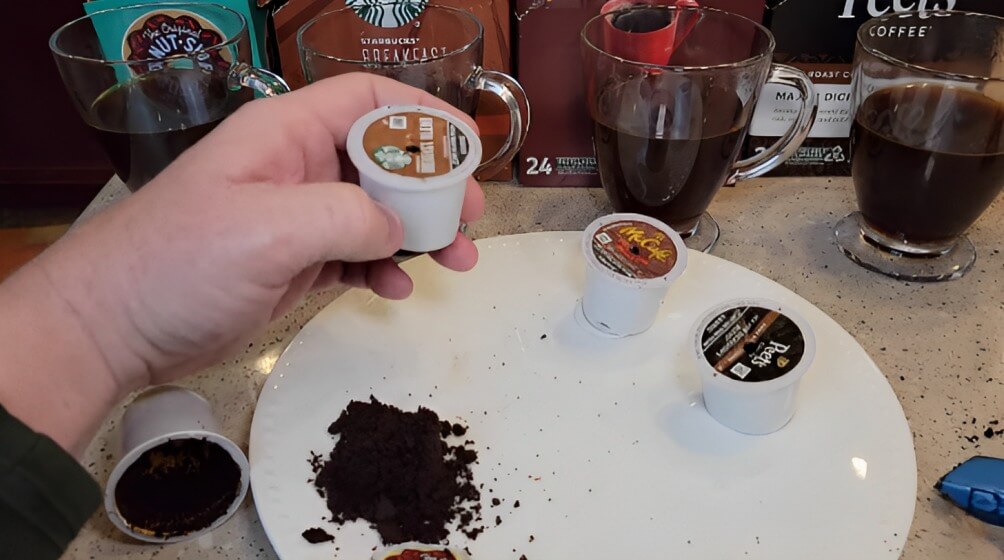
The airtight seal prevents coffee grounds from coming into contact with heat and moisture, retaining freshness.
According to Keurig’s Website, K-cups contain BPA-free plastic and FDA-approved food-grade materials. Most K-cups contain either polystyrene or polypropylene, which may leak carcinogenic substances when heated.
What Makes Plastic a Dangerous Material?
Plastic contains hazardous BPA, BPF, BPS, and phthalates chemicals that can cause hormonal and fertility problems.
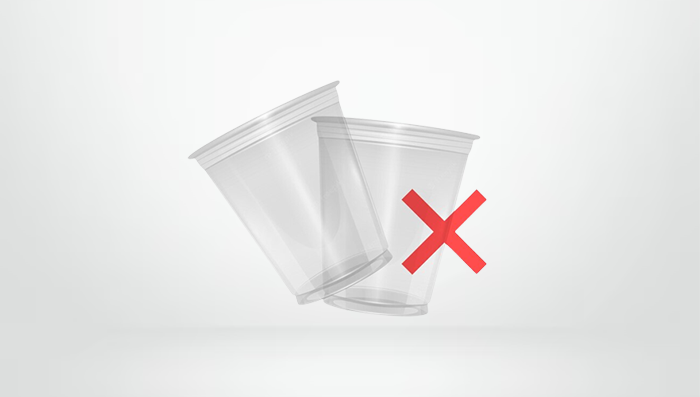
You must find better alternatives to plastic containers, mainly if you use them for heating purposes. Heated plastic can leach chemicals into food or drinks.
BPAs can leak into a cup of coffee when hot water passes through plastic K-cups. Even though Keurig claims that its coffee pods are free of BPA, some traces can still be present in the plastic during the industrial process.
Pros and Cons of K-cups
Keurig K-cups have several pros and cons that you must know about. Some are as follows:
Pros | Cons |
|
|
|
|
|
|
|
|
Is Keurig Coffee Bad for You?
Many Keurig users wonder if Keurig coffee is safe to consume. The answer is Yes!
Even though K-cups are wasteful, Keurig coffee is safe to drink. It is entirely safe to use Keurig machines because it doesn’t release any toxins in your coffee.
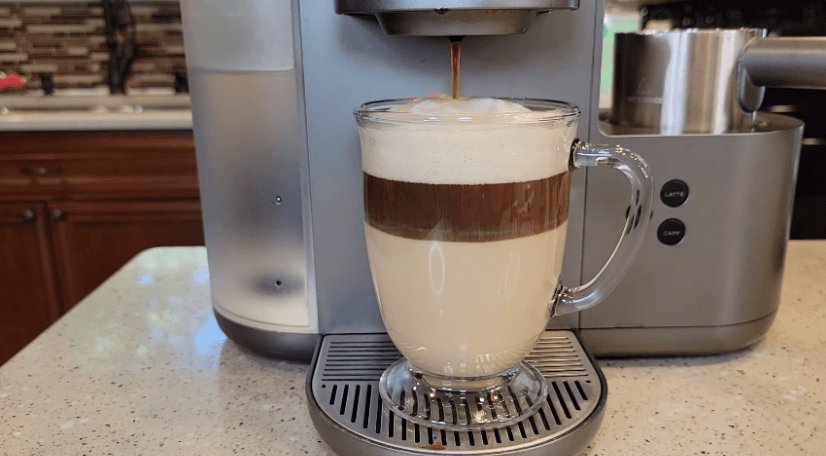
As Keurig coffee pods contain no BPA, they pose no risk of harming consumers. Not only is Keurig coffee easy to prepare, but it also stays fresh for much longer than any open bag of beans or grounds if stored properly.
However, you must keep your coffee consumption moderate. Drinking coffee excessively can cause health issues like diabetes, heart disease, and hormonal imbalances.
Does the Water Heating Chamber of the Keurig Coffee Machine Leach BPA?
Several Keurig machine parts contain plastic, so it’s natural to be dubious about your safety. However, meeting the FDA standards for optimal consumer protection, Keurig uses BPA-free plastic for its heating chamber.
No plastic from the pod leaches into your beverage due to the water temperature in Keurig brewers being well below the melting and softening points.
However, you can make your coffee machine a breeding ground for bacteria if you do not regularly clean it.
How are K-cups bad for you?
Being a Keurig fan doesn’t mean we ignore that K-cups are harmful to some extent or not the best choice. Let’s look at some reasons why we must be considerate while using Keurig coffee pods.
1. K-cups are Terrible for the Environment
K-cups and coffee pods have a plastic container and aluminum foil lid, most of which are not biodegradable or recyclable. A coffee pod contains 95 percent composite plastic, which is not recyclable, so it ends up in a landfill.
To minimize the negative environmental impact, you should discard plastic, aluminum, and paper filters separately. But unfortunately, it is difficult and time-consuming to cut through several layers of a coffee pod to recycle it.
2. K-cups can Cause Potential Health risks
K-cups contain plastic, aluminum, and artificial flavorings. All these materials used in a K-cup come with several health hazards that might seem minimal to us but can cause severe issues in the long run if you use K-cup regularly.
Plastic in a K-cup is BPA-free, but still, it tends to release harmful chemicals. These chemicals can pose adverse health concerns like obesity and cancer.
On the other hand, the aluminum lid of a K-cup is safe for the environment as it is recyclable, but it’s not good for human health. During brewing, aluminum comes in contact with hot water, releasing chemicals that can cause autoimmune diseases, anxiety, and Alzheimer’s.
3. K-cups are not cost-effective
If we compare Keurig coffee with regular coffee, it’s far easier to prepare and takes minimal effort. But with all its convenience, Keurig coffee is heavy on the pocket.
To make a cup of Keurig coffee, you need a new K-cup each time. A K-cup costs around $0.50 each, which makes it numerous times more expensive than any high-quality coffee beans.
However, if you prefer pod coffee over regular coffee, K-cups are still affordable compared to other brands like Nespresso.
On the other hand, if you want to enjoy Keurig coffee but want to cut down on the expenses, you can use a reusable K-cup and fill it with the coffee grounds of your choice.
Are K-cups Recyclable?
As a whole, Keurig cups aren’t recyclable, so cleaning and discarding each pod is extra work. K-Cup pods are recyclable by removing and discarding the foil lid and composting the coffee grounds and interior filter.
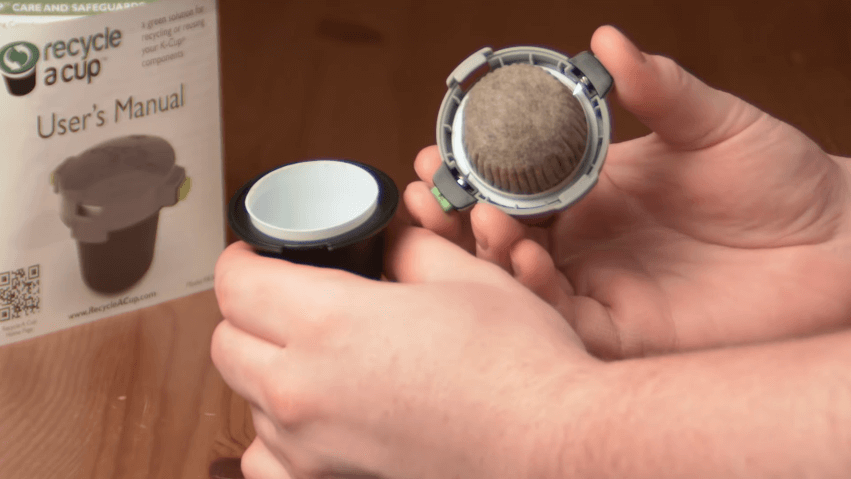
Separating and sorting components into appropriate categories is necessary for recycling. Otherwise, the K-cup you put in the trash will likely remain contaminated with coffee grounds, making recycling impossible.
Recycling a K-cup requires effort, and it can be time-consuming, but it is necessary for our environment. Most people will likely continue to throw away empty cups or neglect to wash them properly, resulting in every K-cup ending up in the landfill.
Are Usable K Cups Better?
Brewing coffee every morning using K-cups saves time and effort. However, what if I tell you there is a better alternative to plastic coffee pods? Yes, reusable K-cups are far cheaper, more eco-friendly, and safer than disposable ones.
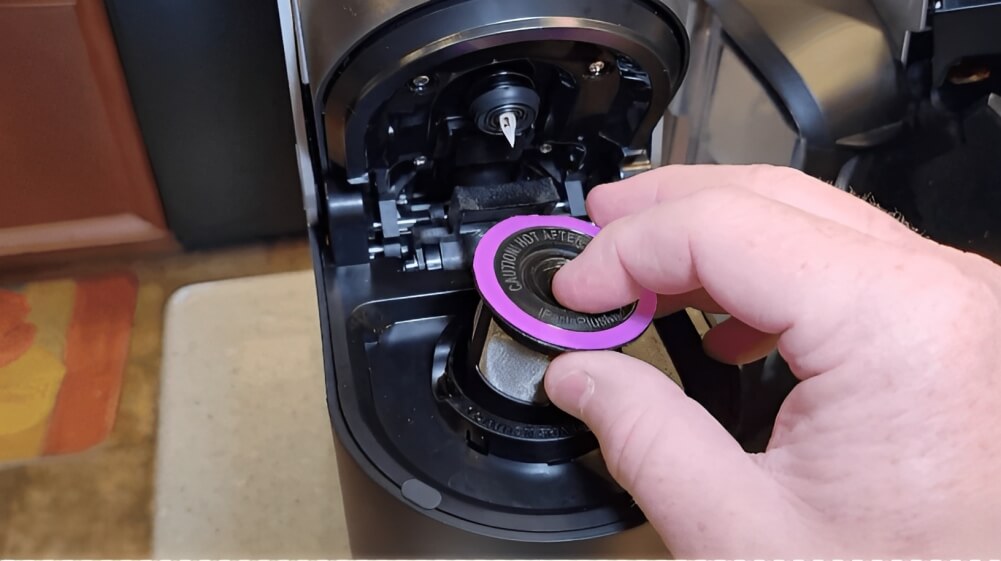
By switching to reusable K-cups, you can contribute to reducing plastic waste by a significant amount. Another advantage of reusable K-cups is that they are cost-effective and cheaper than plastic coffee pods.
Several reusable pod options are compatible with your Keurig machine, like the K-cup Universal filter. You can get a reusable pod for $0.26, whereas a plastic coffee pod is around $0.50. It can make a significant difference and reduce your overall coffee expenses.
How to Reduce Harmful Toxins and Chemicals in your coffee?
Despite all the claims of K-cups being free of toxins and chemicals, they can dispense harmful substances in your coffee, like Ochratoxin A, Acrylamide, and mycotoxins.
Here are a few tips that can help in reducing harmful toxins in your coffee:
1. Be mindful of your coffee intake
Coffee lovers might not count how many cups they consume throughout the day. Coffee can release toxins that throw your hormones out of whack and increase anxiety.
So make sure you keep your caffeine intake moderate, roughly 400 mg daily. A Keurig 8 oz cup (250 ml) can contain 75 mg to 150 mg caffeine, so limit your coffee to 2 to 3 cups.
2. Choose Dark Roasted Coffee
Coffee beans can produce Acrylamide chemicals during roasting. It is a harmful chemical present mostly in light-roast coffee beans. So to reduce the amount of acrylamide in your coffee, choose dark roast coffee beans.
It can not make your coffee 100% chemical free, but it can still be a healthier choice.
3. Buy Organic Coffee
The most viable coffee to consume is organic coffee because it is free of pesticides, chemical fertilizers, and any hazardous substance that could cause harm.
Some of the organic coffee brands for Keurig coffee pods are:
- VitaCup Organic Keto Max
- Organic Coffee Co. Breakfast Blend
- Peet’s Coffee Organic Alma De La Tierra
- Caza Trail Extra Bold
- Newman’s Own Organics Special Blend
Conclusion
A Keurig coffee machine is entirely safe because it has high-quality materials to give you the best coffee experience. K-cups are 100% BPA-free, non-carcinogenic, and made with Type-5 plastic for top-notch safety.
Keurig coffee can harm your health if you drink excessively and do not clean your machine regularly. I hope this article cleared all your doubts regarding K-cups.
Enjoy your Keurig coffee!
FAQs
Is K-Cup actual coffee?
Yes! K-cups contain actual coffee. The coffee goes through roasting and grinding before reaching you as a k-cup.
Why do Keurig K-cups say “cool before peeling”?
It can get too hot to touch as hot water passes through the K-cup during brewing. Let the k-cup cool down before you rip off its peeling to discard the coffee grounds.
Do K-Cups leach chemicals?
No! K-cups do not leach chemicals into your coffee. When hot water passes through the pod to brew coffee, some minimal substances may dispense in your coffee.
Should you remove the K cup after use?
You must wait a few minutes for the coffee pod to cool down and remove it immediately.
What is the least harmful coffee?
You can prepare the least harmful coffee with organic coffee beans containing the least chemicals. Black coffee is the healthiest coffee, which contains no milk, sugar, and sweetening syrups. It has fewer calories and poses no health risks.
Do K-Cups waste coffee?
K-cup coffee pods contain around two tablespoons of ground coffee. After you brew a k-cup, the coffee grounds go to waste.
How often can you use K-Cups?
K-cups are for only one-time use. When you brew a pod, all its flavors and strength dispense into your coffee. If you use it twice, it will give you bland coffee that will taste like water.
Does Keurig have a prop 65 warning?
Yes! Keurig complies with California Proposition 65. It is a warning alert to inform consumers of potential health risks.
Why does my coffee maker have a cancer warning?
Your coffee maker has a cancer warning because it can release harmful chemicals, like metals and lead, into your coffee.
Can you get sick if you don’t descale your Keurig?
Yes! If you ignore the cleanliness and maintenance of your Keurig coffee maker, it can have build and gunk, which can later dispense into your coffee during the brewing process. To ensure your coffee is hygienic, you must descale your machine every three to six months.

 You can brew coffee within a few minutes using K-cups.
You can brew coffee within a few minutes using K-cups. You can't recycle K-cups as a whole.
You can't recycle K-cups as a whole.